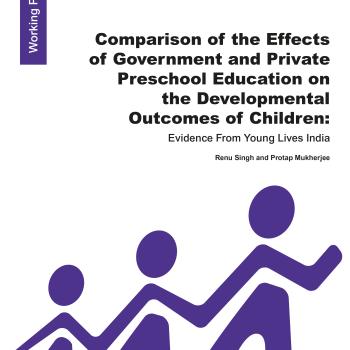Publication Information

Over the past two decades the importance given to preschool education as laying the foundation for lifelong learning and development has been increasingly recognised. India’s 12th Five-Year Plan (2012–17) has conceptualised the pre-primary and early primary sub-stages from 4 to 8 years old as an ‘integrated early learning unit’, to ensure a sound foundation for every child. With the expansion of private preschools, particularly in urban areas, even the poorest families are opting for low-fee private schools rather than free government services offered through the anganwadis (preschool centres). While evidence from developed countries exists that preschooling can have long-term beneficial effects on children, longitudinal evidence in India regarding the association of preschool education with later developmental outcomes is scarce. In light of this, this working paper draws upon Young Lives panel data to explore whether children who attended private preschools demonstrate higher cognitive skills and enhanced subjective well-being at the age of 12, compared to those who attended government preschools.
Using linear and logistic regression models, as well as propensity score matching techniques, the analysis revealed that children who attended private preschools have significantly higher mathematics scores and more positive subjective well-being than children who attended government preschools. However, there is no significant association of private preschools with higher PPVT scores. Another important finding is that entering preschool after the age of 4, is shown to have a significant negative association with both cognitive achievement, as demonstrated by mathematics and PPVT scores, and affective domain, as measured by subjective well-being at the age of 12. The propensity score matching reveals that children who had private preschool education scored nearly 10 times and 13 per cent higher in mathematics scores and subjective well-being respectively at the age of 12 than children whose preschool education was provided by the government.
Given that the recently enacted National Policy on Early Childhood Care and Education recognises early childhood education as the foundation for all future learning and as a sorely neglected area, it is clear that policymakers must prioritise early childhood education, and quality within preschools be closely monitored, to ensure that the most disadvantaged children have access to high-quality preschool education programmes.

Over the past two decades the importance given to preschool education as laying the foundation for lifelong learning and development has been increasingly recognised. India’s 12th Five-Year Plan (2012–17) has conceptualised the pre-primary and early primary sub-stages from 4 to 8 years old as an ‘integrated early learning unit’, to ensure a sound foundation for every child. With the expansion of private preschools, particularly in urban areas, even the poorest families are opting for low-fee private schools rather than free government services offered through the anganwadis (preschool centres). While evidence from developed countries exists that preschooling can have long-term beneficial effects on children, longitudinal evidence in India regarding the association of preschool education with later developmental outcomes is scarce. In light of this, this working paper draws upon Young Lives panel data to explore whether children who attended private preschools demonstrate higher cognitive skills and enhanced subjective well-being at the age of 12, compared to those who attended government preschools.
Using linear and logistic regression models, as well as propensity score matching techniques, the analysis revealed that children who attended private preschools have significantly higher mathematics scores and more positive subjective well-being than children who attended government preschools. However, there is no significant association of private preschools with higher PPVT scores. Another important finding is that entering preschool after the age of 4, is shown to have a significant negative association with both cognitive achievement, as demonstrated by mathematics and PPVT scores, and affective domain, as measured by subjective well-being at the age of 12. The propensity score matching reveals that children who had private preschool education scored nearly 10 times and 13 per cent higher in mathematics scores and subjective well-being respectively at the age of 12 than children whose preschool education was provided by the government.
Given that the recently enacted National Policy on Early Childhood Care and Education recognises early childhood education as the foundation for all future learning and as a sorely neglected area, it is clear that policymakers must prioritise early childhood education, and quality within preschools be closely monitored, to ensure that the most disadvantaged children have access to high-quality preschool education programmes.

